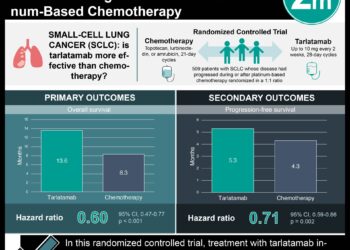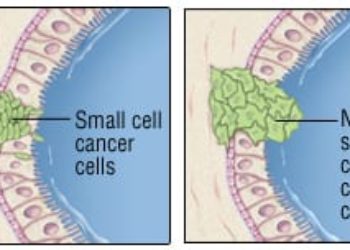Immunotherapy vs Chemoimmunotherapy in Older Adults With Advanced NSCLC
1. Adding chemotherapy to immunotherapy did not prolong OS or PFS, with non-significant differences in HR.
2. Grade 3 or higher immune-related adverse events occurred in 24.3% and 17.9% in the ICI-chemotherapy and ICI-alone groups.
Evidence Rating Level: 2 (Good)
Study Rundown: Immune checkpoint inhibitors (ICIs) have significantly improved outcomes in non-small cell lung cancer (NSCLC), with pembrolizumab showing promise in older adult populations based on pooled analyses and cohort studies. However, the efficacy and safety of combining ICIs with chemotherapy in older NSCLC patients remain uncertain, with previous analyses failing to demonstrate an overall survival benefit in patients aged 75 and older. This retrospective study evaluated combination ICI-chemotherapy in older NSCLC patients. The collected endpoints included objective response rate (ORR), progression-free survival (PFS), overall survival (OS), and adverse events. The review found that 28% received ICI-chemotherapy combination treatment (median OS was 20.0 months, median PFS was 7.7 months), and 34% received ICI alone (OS 19.8, PFS 7.7). Stratifying by PD-L1 score, the HR for median OS was 0.91 (non-significant) in ≥50% PD-L1, and HR 0.79 (non-significant) in 1%-49% PD-L1. With regards to safety, grade 3 or higher immune-related adverse events occurred in 24.3% and 17.9% in the ICI-chemotherapy and ICI-alone groups, respectively (p=.03). Grade 3 and higher myelosuppression was similar in the ICI-chemotherapy and platinum-doublet chemotherapy groups. The strengths of this study include its subgroup analysis and size of participants, and the limitations include its retrospective nature and its single ethnicity cohort. Overall, this study found that ICI-chemotherapy combination treatment had similar survival compared with ICI alone in patients 75 years and older with an increased incidence of adverse events.
Click to read the study in JAMA
Relevant Reading: Clinical Outcomes and Toxic Effects of Single-Agent Immune Checkpoint Inhibitors Among Patients Aged 80 Years or Older With Cancer
In-Depth [retrospective cohort]: This multicenter study conducted in Japan reviewed records of adults over the age of 75 who had stage IIIB or above NSCLC (n = 1245), EGFR mutations were excluded. The median follow-up duration was 19.2 months. The review found that 28% received ICI-chemotherapy combination treatment (median OS was 20.0 months [95%CI, 17.1-23.6], median PFS was 7.7 months [95%CI, 6.5-8.7]), 34% received ICI alone (OS 19.8 [95%CI, 16.5-23.8], PFS 7.7 [95%CI, 6.6-8.8]), 25% received platinum-doublet chemotherapy (OS 12.8 [95%CI, 10.7-15.6], PFS 5.4 [95%CI, 4.8-5.7]), and 12% received single-agent chemotherapy (OS 9.5 [95%CI, 7.4-13.4], PFS 3.4 [95%CI, 2.6-4.0]). Stratifying by histology, the HR for median OS was 1.03 (95%CI, 0.78-1.37) when comparing ICI-chemotherapy vs ICI alone in adenocarcinoma, and HR 0.79 (95%CI, 0.57-1.09) in squamous cell carcinoma. Stratifying by PD-L1 TPS, the HR for median OS was 0.91 (95%CI, 0.62-1.34) in ≥50% PD-L1 TPS, and HR 0.79 (95%CI, 0.55-1.14) in 1%-49% PD-L1 TPS. With regards to safety, grade 3 or higher immune-related adverse events occurred in 24.3% and 17.9% in the ICI-chemotherapy and ICI-alone groups, respectively (p=.03). Grade 3 and higher myelosuppression was similar in the ICI-chemotherapy and platinum-doublet chemotherapy groups. Overall, this study found that ICI-chemotherapy combination treatment had similar survival compared with ICI alone in patients 75 years and older with an increased incidence of adverse events.
Image: PD
©2024 2 Minute Medicine, Inc. All rights reserved. No works may be reproduced without expressed written consent from 2 Minute Medicine, Inc. Inquire about licensing here. No article should be construed as medical advice and is not intended as such by the authors or by 2 Minute Medicine, Inc.







